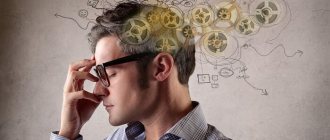What is mindfulness? Mindfulness is the continuous process of monitoring current experiences, i.e. everything that happens in the present moment, without being distracted by thoughts of the past or future. By becoming aware of himself and his life, a person becomes able to not only receive practical benefit from every moment he lives, but also find connections between all past and ongoing events, understand his life purpose, make an informed choice in a given situation, make fewer mistakes, etc. .P.
Mindfulness is a never-ending process, it lasts a lifetime and has no specific end point. And the development of awareness always relates to the specific situation in which a person is, to the activity in which he is involved. And there is no one specific way to develop awareness, because... this process has its own directions and levels.
There is a basic level of awareness, the development of which is facilitated by any practical actions, by performing which you can learn to control your emotions, be in a state of presence, be able to relax and immerse yourself in a meditative state. If a person is able to realize only his immediate desires and needs, this is low-level awareness. A higher level manifests itself when a person sees more than just the instincts of his “I”, takes into account the interests of others, controls his thoughts and feelings, tries to expand the boundaries of his perception, tune in to the same frequency with the world around him, etc.
As has already been said, awareness is a process that occurs throughout life, and new facets of it are learned only when a certain stage has been passed. But the interesting thing is that the more often a person tries to be aware and the more he strives to become aware, the more he comes to understand that the real work on awareness is yet to come.
However, a conscious person is always different from an unconscious person. For example, outwardly this is expressed in greater concentration and attentive gaze, measured movements, composure, the ability to control emotions, thoughtful speech, non-mechanical reactions, the presence of specific goals and objectives, sympathetic communication with other people, and control of one’s behavior. A conscious person strives to find answers to the questions “Who am I?”, “What is my path?”, “Where am I going?”, “What am I doing?” The more aware a person is, the more clearly he is able to identify and see his behavioral patterns, the motives for his actions, the causes of problems and new opportunities. If you set a goal, you can cite dozens of advantages available to a conscious person. We decided to present the most significant of them in the form of theses.
Awareness comes gradually
Awareness is a special state of consciousness in which we do not wander in the chaos of thoughts and emotions, but are in the current moment, here and now. We begin to clearly understand everything, but most importantly, we become aware of our real self. Or you can say, it awakens in us. As a result, we go beyond the psyche and can look at its manifestations from the outside. This immediately solves many problems. Uncontrollable negative emotions, which previously destroyed us from the inside, leading to illness, finally cease to have power over us and gradually dissolve.
It all seems clear and sounds beautiful. But it will not be possible to gain awareness immediately, at the “pike’s command, at my will.” This is a workout and the results will not be immediate. Our consciousness must get used to working more productively, development will be gradual. The habit of living unconsciously is deeply rooted in us and it takes time to change it. You cannot gain awareness right away. This is a process, and the growth of awareness can go on endlessly. You can’t say that a person has become as smart as possible and that’s all. You can develop your mind throughout your life. So it is with awareness. At first we are aware a little, then more, even more, and so on.
But don't be alarmed. You don’t have to be super conscious to improve your life. Already your first efforts will bear fruit, negative emotions and uncontrolled internal dialogue will significantly decrease. And having felt all the charm of this state, you will be happy to increase the power of awareness. For you, such work on yourself will be easy and relaxed, you will like it. And someday your awareness will increase so much that you will simply be surprised how much your life has improved. “How did I live before without her,” you say to yourself.
But first you have to work hard. There is no way without this.
What is the difference between a conscious person and a disorganized one?
What is the essence of this personal quality? How to understand whether awareness is present or not at all?
People with this quality always know the answer to four questions about the current moment in life. These questions sound like this:
- What am I doing right now?
- Why am I doing what I'm doing?
- Do I want to achieve the goal of the action?
- Can I perform the action differently, better?
The questions, at first glance, are simple, and it seems that every person is able to answer them. But everything is not as easy as it seems.
Where to begin?
And you need to start by removing the importance of your thoughts and emotions.
The fact is that we are very strongly linked to them. And such a thing as a sense of self-importance is to blame for everything.
A separate article will be devoted to it. Now the main thing is to understand that this feeling leads a person to pride, selfishness, stubbornness, disrespect for other people, and placing oneself at the center of the whole world. Feeling important actually has both pros and cons. Without it, we would not be able to interact normally with people or defend our opinions. But excessive self-importance actually leads to big problems, gives rise to many negative emotions, and obscures our true vision of the world. What we are interested in now is that due to a sense of self-importance, a person is strongly attached to his feelings, thoughts and emotions. He considers them unshakable, very important, unchanging, and not subject to criticism. “I said so, that’s it, it’s the law.” “My opinion is unshakable.” “My thoughts and emotions are me, they are important and unchanging.” All this leads to the fact that a person considers his character, his reactions, his entire psyche as a very important part of himself that cannot be changed. Even if he is not happy with his character, he still believes that nothing can be done about it. This is also important.
The first step towards awareness is to reduce your sense of self-importance. To do this, you need to change your worldview and understand what I am about to say.
Our thoughts, feelings and emotions are actually not as important as they seem to us. This importance was invented by us, other people look at our character completely differently, they don’t care about us. But most importantly, all manifestations of the psyche are just a program that exists in our head and which can be erased and replaced with a new one. It is only a part of ourselves, but it is not us. We are actually something more than all these thoughts and emotions.
Learn to listen to other people's opinions. Not only your own, but also their thoughts deserve attention. Try to understand what the other person wants. Stop arguing, maybe your opponent is actually right.
Just stop, stop being proud and not seeing anyone around. Look at other people with understanding and respect.
Maybe you don’t want it, you’re not used to it, but try it. You want to become conscious and change your life. At first it will be difficult and you will have to change yourself.
Such a change in worldview leads to the fact that a person stops, calms down his pride a little, pauses the internal mental conversation and begins to notice at least something around him, stops being stubborn like a sheep. And here the so-called pause in response appears, the key to awareness.
What is mindful eating?
Often people who are concerned about how to eat mindfully do not pay attention to the general information that characterizes this personal quality. They try to “get straight to the point” and are looking for a certain list of actions that need to be completed in order to stop eating uncontrollably.
However, mindful eating is not a diet or a set of specific techniques. This is not counting calories or kilograms, or giving up anything. In simple terms, mindful eating is eating food not to “fill your stomach” or get psychological relief, but to benefit your body.
This type of nutrition arises immediately as soon as a person begins to realize responsibility to his own body for how and what he feeds it. In other words, when choosing products, a person intuitively proceeds from the needs of his body and their understanding.
Stop the world
To come to awareness, you need to find this pause in reaction within yourself. Or, you could say, you just need to stop the world.
A person is constantly in a hurry to somewhere, doing something, spinning through life like a squirrel in a wheel. Maybe this is all good, but it leads to the fact that his internal dialogue is constantly working, without stopping for a second. We are always thinking about something, making plans for the future, imagining what will happen next, remembering past events, reacting emotionally to events, and so on ad infinitum. This has become a habit and has led to the fact that we are constantly attached to our thoughts, emotions, and our ego. The real self is in a sleepy state.
A person's attention constantly jumps like a mad monkey from one object to another, unable to focus on one thing.
There is no talk of any awareness in such conditions.
All this led to an unconscious reaction to the surrounding reality. A person lives like a robot, obeying the programs programmed in his head.
The formula is: stimulus-response. All! And these reactions are already in our brain, and we always react the same way. Our life is the result of such programs and we are not able to change it. And the world that we observe is also the result of the work of the same programs. We look at the world through the prism of our ego. You can read more about this here.
But we can stop the habitual reaction, which means we can change our lives. Changing your life starts with changing your thinking. Change your thoughts and your life will change. But the world around us will also change. If we stop, for example, being angry with people and seeing everyone as enemies, then we will come across more good people. To change the world, to rebuild it, you must first stop the old world, stop the old reaction to the situation. To do this, you need to insert one more link into the stimulus-response formula: a pause, leading to freedom of choice. A new formula emerges: stimulus - pause (freedom of choice, stop) - and only then a reaction, but it will be conscious, and not automatic. This is stopping the world, stopping the habitual reaction, stopping the internal dialogue, awareness.
That is, before the reaction occurs, and we react habitually, there is a pause. We stop, stop the internal dialogue, conscious attention turns on, which itself will decide how to react in the current situation. We are transforming from robots into conscious people.
The techniques and exercises described below will help you come to such a stop and better understand what it all is.
Is nutrition awareness possible without the overall development of this personal quality?
When asking the question of how to eat consciously, a person often does not understand what this quality is. It is impossible to develop it in just one manifestation. You can’t “be a little aware here and leave a little chaotic here.” The nature and essence of this personal property are based on harmony, and it cannot be selective.
Moreover, people learn how to be mindful throughout their lives. This process has no end because it is self-improvement. In fact, this is not some kind of skill, it is a person’s way of life and thinking.
Accordingly, in order to start eating consciously, you need to generally develop this quality in yourself.
Exercises and techniques that lead to awareness
To make the task easier and quickly achieve awareness in everyday life, you need to insert one more value into the above formula. Remembering to be mindful. It turns out like this: stimulus-remembering-pause-reaction.
And for beginners even this scheme: remembering-stimulus-remembering-response.
That is, your path to awareness begins with the fact that you must, either on a schedule, or by a reminder on your phone or something else, remember that you must be aware and not drown in the routine of internal dialogue.
You must deliberately find time to practice throughout the day.
Practice at work
Set several alarms on your phone to remind you to be mindful during work hours. If possible, set aside 5 minutes every hour or 2 hours. Step away from the everyday hustle and bustle, take a break from work. Leave all problems, unresolved matters for a while, 5 minutes “will not do you any good.”
Look carefully at your palm, consider all the lines on your palm. Feel it, imagine that it is hot, then cold, play with the sensations. Mindfulness means that we can calmly direct our attention to some object without being distracted by extraneous thoughts.
Take a look at the objects around you, look out the window, what you see on the street. Scan your eyes with everything that surrounds you. The main thing is to look at everything without judgment, without thinking about objects, that is, not to include internal dialogue, the work of the mind, but simply observe.
At first you won't be able to do this. Despite the apparent simplicity of these mindfulness sessions, they give very good results and lay the foundation because of your awareness. But because of this simplicity, the practitioner does not attach importance to such practice, skips it, and considers it frivolous. Thoughts like this begin to creep into my head: “I’m doing nonsense, I’d rather get busy, I won’t waste time on mindfulness sessions.”
Therefore, overcome yourself and first practice through effort, be disciplined. You will enjoy these breaks from work later. They will give you rest and relieve your head well. After this, your productivity will only increase.
The next stage of practice at work will be the ability to observe those thoughts that will creep into your head and interfere with awareness. A person is not used to just observing the world around him without evaluation. As soon as you start doing this, your restless mind will try to return your attention to the usual course of life's bustle. He will want to think about current problems again, will discourage you from practicing, and so on. If you can step back from these thoughts and observe them, if you catch yourself again thinking about something rather than observing your palm or other objects, then the power of your awareness will increase many times over. As soon as you realize that you are thinking again, do not fight your thoughts, but simply move away from them, observing from the side and again, without being distracted by them, engage in practice. Be aware and observe everything that is happening around you.
After you start to succeed at something, you can add observation of your body. Walk your attention throughout your body. Look, you probably have some parts of your body that are tight due to the specifics of your work. Maybe you sit in one position at the computer a lot or strain your eyes a lot. Close your eyes, relax them, and also take a comfortable position and relax your whole body. Look consciously at areas of muscle tension and relax them. In a word, relax, take a break from work, but now do it more consciously, without being distracted by thoughts, but calmly observing parts of the body. Believe me, after such sessions, I repeat, your productivity at work will increase. If possible, relax while lying down, scanning your body with your attention, try doing shavasana or yoga nidra. You can read about these wonderful techniques by following the link; they also increase your awareness.
Mindfulness while eating
The more you organize such mindfulness sessions, the faster its power will grow. Mindfulness can be applied to any situation. For example, a person has such a bad habit as eating food quickly, while talking, watching TV and thinking about something all the time.
If we are mindful, then we do what we do without being distracted by extraneous internal dialogue. In fact, if we eat like this, we not only lose awareness, but also undermine our health. Be sure to read about this in the article about medicinal chewing. Unconscious and rapid swallowing of food necessarily leads to diseases of the gastrointestinal tract. The worst thing is when you eat and at the same time experience negative emotions. This is a direct road to gastritis, and then stomach cancer.
Learn to eat mindfully.
Before swallowing food, smell it and feel how pleasant it smells. Place a piece of food in your mouth. Feel the taste, understand that you like it. Chew your food thoroughly, and don’t think about anything else. Swallow the food and feel how it enters your stomach. It tastes good and makes you feel good. If you do everything right, you will see how your restless mind prevents you from consciously eating. Extraneous thoughts will begin to creep into your head. This is our habit, an unconscious state. Catch yourself thinking and not practicing again. After this, calmly turn your attention to food and continue the practice. After consciously eating, you will feel the benefits of such a meal, a pleasant state in your stomach, and you will be surprised that you are full much faster.
Mindful shower
You can use such an interesting practice as a mindful shower.
After a working day, in order to wash away all the negativity, while taking a shower, do not dwell on the events of the past day in your head, but simply feel how the streams of water touch you, watch how the water flows over your body and you feel good about it. Monitor your bodily reaction, how your body reacts if you take a contrast shower and change the water temperature. The combination of a contrast shower and a mindful shower will only benefit you, improve your health and increase the power of awareness.
Unload your brain before bed
Internal dialogue prevents us from being conscious, and therefore, at the first opportunity, we need to reduce the power of its influence on us. The best time for this is going to bed. Before falling asleep, take a comfortable lying position and try to relax without thinking about anything. You can bring your attention to your body and relax areas of tension. This simple technique will make your sleep healthier and also increase your awareness. You can read how to fall asleep correctly and achieve healthy sleep here. You can also practice yoga nidra or relax in shavasana before bed.
Mindful listening to music
Many people don't know how to truly listen to music. Basically, they turn it on as a background to avoid boredom and to fill the emptiness in their soul. But they don’t hear it, they don’t feel it, because there is no conscious listening to music. Put on headphones so that you are not distracted by extraneous sounds, turn on your favorite music, no matter what.
Completely immerse yourself in the music, listen to it without being distracted by extraneous thoughts. Isolate the sound of a particular instrument from the general sound, for example, listen to what rhythm the drums produce, how beautiful a guitar or other instrument sounds. Feel how beautiful music really is if you listen to it well and listen without distractions. You will find a lot of interesting things in this practice, you will definitely like it. Give it a try.
Do familiar things in an unusual way
People who live on autopilot are very distracted. They cannot remember whether they sent the letter or whether they closed the window in the apartment. How to develop awareness? You need to start with the fact that you need to do familiar actions in an unusual way. You can practice this constantly. Let's look at it with an example. If you're in an elevator and can't remember whether you closed the door, try a simple exercise. Close the door not with your right hand, as usual, but with your left. A non-trivial action will engage your brain, and you will know for sure that the door is closed.
You do not need to visit a mindfulness center. You don't even have to take special courses. If you realize that you cannot remember your usual actions, then change your habits. For example, take a different route to work each time. You may have to make a slight detour and walk along a parallel street. But unlike a standard walk, you will remember this route. The same applies to household items. For example, in order not to fall into delirium, you can brush your teeth in the morning not with your usual hand, but with another hand that you usually do not use. A non-standard approach to your usual activities will help you control your actions, and most importantly, remember their results.
Concentration and deconcentration
There are special psychotechniques that significantly train attention and develop awareness. This is concentration and deconcentration.
Concentration is prolonged, one-pointed attention on one object. Deconcentration is when we disperse our attention and observe several objects at once. When we practiced the above techniques, for example, looking at the palm of our hand, we were essentially practicing concentration. You can simply enhance this technique by choosing an object and looking at it for a long time, concentrating all your attention on it. You've probably heard about the famous Eastern technique of looking at a candle. Now you understand that there is nothing mystical about it and that in fact it is needed to develop awareness and awaken the real Self. You yourself can choose any object and train your attention by trying to look at it for a while without being distracted by extraneous thoughts and other objects. Many people draw a dot on a white sheet of paper, place it in front of them and look at it.
And to apply deconcentration, try looking at an object to your left, to your right, and then at both objects at the same time. This will be deconcentrated attention. It is often used in life. For example, when we drive a car, to drive safely, we deconcentrate and immediately try to observe several objects on the road: signs, traffic lights, pedestrians, and so on. The special deconcentration technique differs from examples from life in that we do it more carefully, without being distracted by internal dialogue.
Why do such techniques lead to awareness? The thing is that in life the usual work of our attention is that it constantly jumps from one object to another, unable to concentrate. This is because it is linked to our restless internal dialogue, our psyche and mind. They command our attention where to direct our gaze. This is our constant bustle of life. Also, deconcentration in life is not clear and complete. If we further give an example about driving a car, we often do not notice the real situation on the road because we are distracted by extraneous thoughts.
When we specifically use concentration and deconcentration, we seem to pull attention out of the shackles of the mind and force it not to obey the internal dialogue. And what exactly draws attention. I said we're pulling it out. In fact, this is what the real Self, our awareness, does. By specifically directing attention somewhere, we become disidentified with mental chatter, do not react as usual out of habit, and therefore awaken our will, our conscious, chosen perception. This is how we develop awareness.
You will see for yourself that you cannot focus your attention on one object for a long time. The internal dialogue strives to capture our attention again, and we again begin to think, losing concentration. If you are absorbed in the mind, you have lost awareness. Once you understand what you are thinking, you reawaken your awareness and calmly return your attention to the object. This is how awareness is trained. And the longer you can observe one object, that is, concentrate, the stronger the power of your awareness will be. Therefore, you train to concentrate for a long time at least once a day, the main thing is that this happens regularly without long, several-day breaks.
Summarize
How to practice mindfulness Photo: Depositphotos
If for some reason you abandoned the practice and now don’t know where to start, don’t worry. Mindfulness is a very liberal way of living, and there are plenty of ways to get into the groove available.
Haven't meditated for a few weeks? No problem, just add deep breathing exercise to your daily routine. Have you forgotten the last time you wandered through an art gallery or walked through the forest? No problem. If you don't have time for this, take a moment and just watch the clouds.
“We can see the reflection of the moon in the ocean only when it is calm and quiet” (Thich Nhat Hanh)
By living consciously and having a rich arsenal of mindfulness practices, you will always be able to choose the right tool for the job, despite stress, workload and fatigue. And the larger this arsenal, the easier it is to fit mindfulness into your daily life, without considering it just another item on an already too long to-do list.
Material prepared by: Alexander Sergeev Cover photo: Depositphotos
Sources
Live slowly / B. McElree; lane from English L. G. Tretyak. - Minsk: Potpourri, 2021. - 272 p. : ill.
Mindfulness in stressful situations
All the above techniques are good, but as soon as you find yourself in a stressful situation, negative emotions come upon us so strongly that we immediately forget about practice, about a conscious state and give in under their onslaught. Emotions consume us. That is why we must train mindfulness in difficult situations, only then will you be able to withstand any stress and not lose your head in any circumstances.
For example, you have an important meeting and you are attacked by fear. The most important thing here, until the moment when the fear is not yet very strong, is to remember that you need to be conscious, that is, apply the formula that I spoke about: stimulus (emotion) - memory - pause - conscious reaction. And to be aware means not to be consumed by fear, but to observe it. It is useless to fight with him; fight is a form of cooperation. By trying to get rid of fear, you will come to even greater tension and only intensify it. You need to try to relax and look at your fear from the outside. You are watching him. That is, when you come to a meeting, you understand that you are afraid, you see how your body is shaking, and you begin to look from the outside at your fear and bodily reactions associated with fear. If you can do this, fear will no longer cloud your head much, and you will behave adequately and will not fail the meeting. It is unlikely that you will be able to completely get rid of it, but sometimes a little awareness is enough to save the situation. Therefore, it’s okay if you are not good at observing emotions at first. The main thing in a stressful situation is not to lose your head, but to remember that you need to be aware. Over time, the power of your awareness will increase and you will be less nervous, gain confidence and stress resistance.
Who could he play?
Are you walking down the street and have nothing to occupy your mind? How to train mindfulness? To avoid getting lost in your thoughts, you can engage in interesting activities. Study passers-by carefully. Pick one person out of the crowd and think about what role and what movie the person could play. For example, a man with a serious face can become a killer, and a pretty girl can become a professional model. Look for people with unusual appearance in the crowd. They find it much more enjoyable to come up with different roles.
This exercise can be practiced a little differently. Try to guess who the people around you on the bus are. This nice guy is a manager, or maybe he's a stuntman? Try to base your assumptions not just on intuitive messages, but also on the external attributes that you see on a person. For example, a person with an interesting hairstyle can be a designer, and a guy with a diplomat can be not only a businessman, but also an engineer. You can check your guesses. Walk up to the person you've been studying carefully and get to know him. This way you will be able to not only develop your powers of observation, but also overcome shyness, and also expand your circle of acquaintances.
Listen to the other person
Each person should pay special attention to the development of awareness. How to develop awareness? You need to learn to listen to people. Have you noticed that some individuals do not understand you? What is this connected with? Most of the time people don't listen to each other. The dialogue goes like this. One person says something, and the other, instead of listening to the interlocutor, is already beginning to form a phrase for an answer. And it turns out that the person still doesn’t know exactly what the opponent will say, but the universal answer is ready. We need to stop conducting dialogue like this. Listen carefully to the words of your interlocutor. Try to understand his thoughts and do not think about the answer before you find out the person’s opinion on the subject of the conversation. This way you will be able to understand people better. Don't be afraid to seem like a slow person. You will generate the desired answer in 2 seconds. Such a pause will not hurt the ears.











